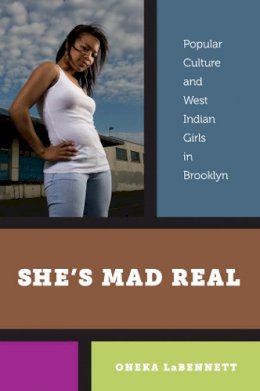
She’s Mad Real: Popular Culture and West Indian Girls in Brooklyn
Oneka Labennett
Overwhelmingly, Black teenage girls are negatively represented in national and global popular discourses, either as being “at risk” for teenage pregnancy, obesity, or sexually transmitted diseases, or as helpless victims of inner city poverty and violence. Such popular representations are pervasive and often portray Black adolescents’ consumer and leisure culture as corruptive, uncivilized, and pathological.
In She’s Mad Real, Oneka LaBennett draws on over a decade of researching teenage West Indian girls in the Flatbush and Crown Heights sections of Brooklyn to argue that Black youth are in fact strategic consumers of popular culture and through this consumption they assert far more agency in defining race, ethnicity, and gender than academic and popular discourses tend to acknowledge. Importantly, LaBennett also studies West Indian girls’ consumer and leisure culture within public spaces in order to analyze how teens like China are marginalized and policed as they attempt to carve out places for themselves within New York’s contested terrains.
Product Details
About Oneka Labennett
Reviews for She’s Mad Real: Popular Culture and West Indian Girls in Brooklyn
Andreea Micu
Journal of Popular Culture
"She's Mad Realprovides a panorama of theory, deep description, and praxis to understand these black teenage girls. LaBennett is writing against the grain, as urban black female adolescents are typecast by their race, age, gender, and presumed class position. Furthermore, as urban black teen girls, it is assumed that they are 'at risk' for becoming underage mothers with low educational aspirations and with little thought of how to becomes wage earners. LaBennett breaks that mold and brings other variables into the mix."
A. Lynn Bolles
American Anthropologist
"LaBennett offers a pivotal critique as she takes issue with national (US) and global imagery of black teenage girls...She's Mad Realreminds readers to appreciate that ethnicity, gender, class and inter-generational differences, along with the contexts in which they are set in motion, are critical to understanding the experiences and subjectivity of American and immigrant black youth."
Aisha Khan
Anthropological Quarterly
"LaBennett is deeply attuned to her subjects. Together, researcher and research subjects explore the wide world around them: hip-hop culture, opportunities for mobility, sexual life, issues of risk, relationships with momits all here! LaBennett develops incisive new interpretations of such concepts as & play-labor and & authenticity. Shes Mad Real both joins a rich ethnographic literature and expands it in revealing politically conscious and hip ways. A fantastic text for in-class use."
Howard Winant,University of California, Santa Barbara ""LaBennett rightfully inserts the experiences West Indian female youth into a transnationalism literature that has privilege the experiences of adult migrants, and which has generally focused on tensions between African Americans and West Indians, rather than acknowledging the complexity of this relationship. The author compellingly advocates for a youth-centered approach to transnationalism, inter-ethnic relations, and multiple conceptions of Blackness that goes beyond the context of the school; in particular, she showcases the consumption practices, fluid work-leisure lives, and critical approach to popular culture she noticed among the young Black women who occupy center stage in the ethnography. These are among the most significant and welcomed contributions of the volume." "
Ana Ramos-Zayas
Critique of Anthropology
